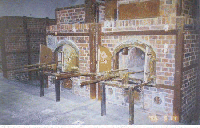some of the pictures that are erik put up are really disturbing, especially the ones of the masse graves. i wonder if any of the prisoners were ever buried without record, if there were any people whose families never found out whether they had died, or whether they had started a new life somewhere else.
it's weird to think of the amount of people who died just in the concentration camps. i don't know the exact number, since the amount varies from source to source, but there was one website i found which said that around 6 million jews were killed in concentration camps, half of which were exterminated in gas chambers. that's only jews!! that doesn't even include the gypsies or homosexuals or any other groups of people that were killed without a just reason. the website that i found is really interesting to look at, even though it's a little disturbing to know all the facts and information about the camps. i think it's important to know though, and to understand what so many people went through. the link is:
http://www.mtsu.edu/~baustin/holocamp.html
there's one picture which i found there that just stunned me. it gives me the creeps to think of how many people went into these...ovens to....ughhh. that's a horrible thought.

i think about 10 million people all together were killed. that's 10 times the population of Calgary. that really gives you alot to think about; that amount of innocent lives being taken all because of one man who...you know what, i don't even want to talk about that right now. i think it's disgusting what happened in the concentration camps. sorry about ranting on about all this, but i can't believe that the allies didn't notice what was happening until almost the end of the war, and how many innocent people died becuase of one mans predjudice against everybody who didn't have blonde hair and blue eyes.
it's weird to think of the amount of people who died just in the concentration camps. i don't know the exact number, since the amount varies from source to source, but there was one website i found which said that around 6 million jews were killed in concentration camps, half of which were exterminated in gas chambers. that's only jews!! that doesn't even include the gypsies or homosexuals or any other groups of people that were killed without a just reason. the website that i found is really interesting to look at, even though it's a little disturbing to know all the facts and information about the camps. i think it's important to know though, and to understand what so many people went through. the link is:
http://www.mtsu.edu/~baustin/holocamp.html
there's one picture which i found there that just stunned me. it gives me the creeps to think of how many people went into these...ovens to....ughhh. that's a horrible thought.

i think about 10 million people all together were killed. that's 10 times the population of Calgary. that really gives you alot to think about; that amount of innocent lives being taken all because of one man who...you know what, i don't even want to talk about that right now. i think it's disgusting what happened in the concentration camps. sorry about ranting on about all this, but i can't believe that the allies didn't notice what was happening until almost the end of the war, and how many innocent people died becuase of one mans predjudice against everybody who didn't have blonde hair and blue eyes.
